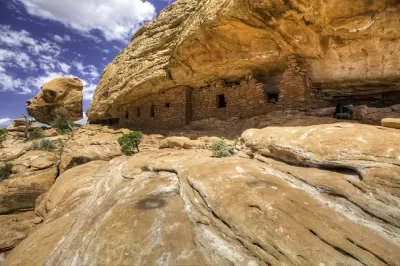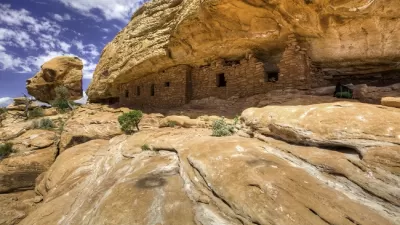But that's no reason not to try, figures Republican Rep. Rob Bishop of Utah, chair of the powerful House Natural Resources Committee, who has his sights on the Bears Ears National Monument, barely a month old.

Former President Barack Obama designated the 1.35 million-acre Bears Ears National Monument in Utah in late December 2016, using the Antiquities Act, signed into law by President Theodore Roosevelt in 1906. Per Wikipedia:
This law gives the President of the United States the authority to, by presidential proclamation, create national monuments from federal lands to protect significant natural, cultural, or scientific features. The Act has been used over a hundred times since its passage. Its use occasionally creates significant controversy.
Bear Ears clearly fits that last category. But before describing it, a paragraph on why this "spectacular western landscape," to quote former Secretary of the Interior Sally Jewell and former U.S. Secretary of Agriculture Tom Vilsack, deserve protection under the Antiquities Act. The description also applies to the other national monument designated on December 28, Gold Butte National Monument in southeastern Nevada.
“The rock art, ancient dwellings, and ceremonial sites concealed within these breathtaking landscapes help tell the story of people who have stewarded these lands for hundreds of generations,” said Secretary Jewell. “Today’s action builds on an extraordinary effort from tribes, local communities, and members of Congress to ensure that these treasures are protected for generations to come, so that tribes may continue to use and care for these lands, and all may have an opportunity to enjoy their beauty and learn from their rich cultural history.”
So what's Rep. Bishop's problem? Kirk Siegler, who covers the urban-rural divide in America for National Public Radio, reports:
"It is the wrong size," Bishop says. "It does not take into account the various uses that the land can do."
That's the big rub for Bishop. A national monument designation generally means new development — like oil and gas drilling, expansion of cattle grazing — is off limits. Only the existing leases that are grandfathered in can be developed.
What Bishop is talking about doing, overturning a national monument of this size, has never been done before. Only a handful of smaller historical monuments have been shut down or transferred over to state management.
Not likely, explains University of Colorado law professor Mark Squillace, an expert on the Antiquities Act.
"The way that the Antiquities Act is structured, it essentially authorizes the president to proclaim, but not to modify or revoke, national monuments," Squillace says.
That position was also confirmed by Montana Congressman Ryan Zinke (R), nominated to be the next Secretary of the Interior.
"Legally, it's untested," Zinke said, adding that he thought the public has generally benefited from a lot of national monuments.
However, Congress does have the power to revoke a national monument, presuming it has the votes, which is uncertain even among the Utah congressional delegation, according to Squillace.
"It turns out that the designation of national monuments is very popular with the public," he says.
The state legislature did take a position by passing HCR 11 [PDF] on Feb. 3, a resolution urging President Trump to rescind the Bears Ears National Monument designation. Last words on Bears Ears goes to a Cynthia Wilson, a representative of North American's first peoples, the Navajo Nation, who spoke against the legislative action:
"As indigenous people, this is nothing new to us, we have always been attacked over our ancestral lands," Wilson told KUER. "We're going to keep defending this monument."
That resolution has been sent to Republican Gov. Gary Herbert's office for his signature. A resolution [PDF] in the legislature also proposes to shrink the 1.9 million-acre Grand Staircase-Escalante National Monument, designated by President Bill Clinton in 1996, to no more than a half-million acres. The resolution has passed the House and is being reviewed by the Senate.
However, as noted earlier, it is up to Congress to rescind or shrink protected lands designated under the Antiquities Act.
FULL STORY: Utah Representative Wants Bears Ears Gone And He Wants Trump To Do It

Study: Maui’s Plan to Convert Vacation Rentals to Long-Term Housing Could Cause Nearly $1 Billion Economic Loss
The plan would reduce visitor accommodation by 25,% resulting in 1,900 jobs lost.

North Texas Transit Leaders Tout Benefits of TOD for Growing Region
At a summit focused on transit-oriented development, policymakers discussed how North Texas’ expanded light rail system can serve as a tool for economic growth.

Why Should We Subsidize Public Transportation?
Many public transit agencies face financial stress due to rising costs, declining fare revenue, and declining subsidies. Transit advocates must provide a strong business case for increasing public transit funding.

How Community Science Connects People, Parks, and Biodiversity
Community science engages people of all backgrounds in documenting local biodiversity, strengthening connections to nature, and contributing to global efforts like the City Nature Challenge to build a more inclusive and resilient future.

Alabama: Trump Terminates Settlements for Black Communities Harmed By Raw Sewage
Trump deemed the landmark civil rights agreement “illegal DEI and environmental justice policy.”

Dear Tesla Driver: “It’s not You, It’s Him.”
Amidst a booming bumper sticker industry, one writer offers solace to those asking, “Does this car make me look fascist?”
Urban Design for Planners 1: Software Tools
This six-course series explores essential urban design concepts using open source software and equips planners with the tools they need to participate fully in the urban design process.
Planning for Universal Design
Learn the tools for implementing Universal Design in planning regulations.
City of Santa Clarita
Ascent Environmental
Institute for Housing and Urban Development Studies (IHS)
City of Grandview
Harvard GSD Executive Education
Toledo-Lucas County Plan Commissions
Salt Lake City
NYU Wagner Graduate School of Public Service




























